Middle East and North Africa

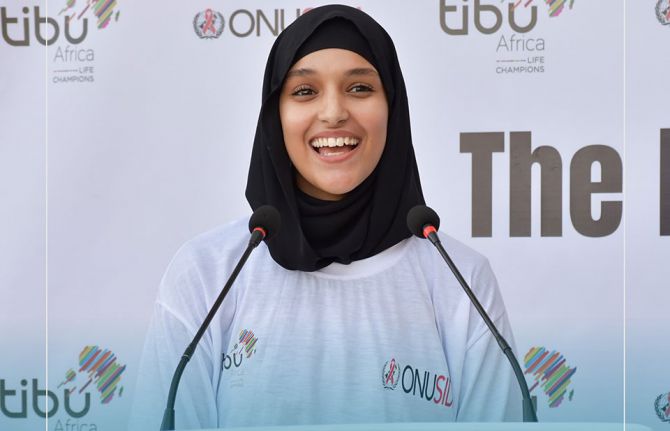
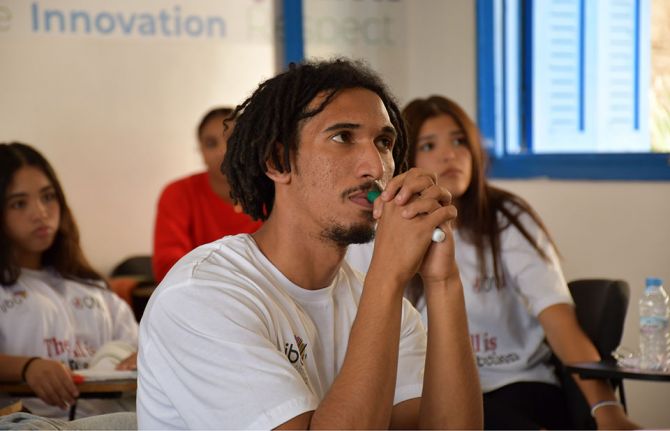
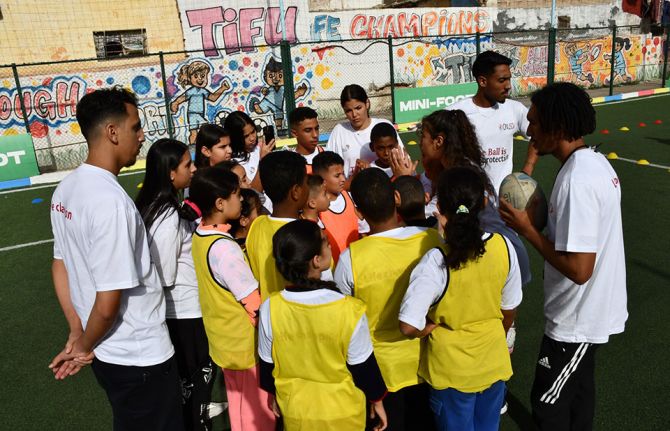
Feature Story
Driving change through sports and HIV awareness
20 December 2024
20 December 2024 20 December 2024Marouane Abouzid, a 25-year-old from Casablanca, grew up in an environment where social challenges and gender stereotypes were pervasive. However, his perspective changed the day he joined "The Ball is Your Protection" program, an initiative by Tibu Africa in partnership with UNAIDS, which uses sports to raise awareness about HIV, gender equality, and gender-based violence.
Before joining the program, Marouane had limited knowledge about HIV and gender equality. “The training on HIV awareness led by UNAIDS and Tibu Africa was a transformative experience,” he says. “It equipped me with essential skills like effective communication and active listening.” Thanks to the program, Marouane discovered how sports can be a powerful tool to engage young people on often-overlooked topics, such as HIV prevention and breaking gender stereotypes.
Now, trained to be a change ambassador in his community, Marouane leads sports activities and participates in educational sessions, becoming a role model for his peers. “I talk openly about what I’ve learned. I encourage my friends to get tested for HIV and respect the rights of others,” he shares.
For Marouane, this program was more than just training. “Today, I feel ready to take action and share what I’ve learned with my community,” he says.
During the closing ceremony of the "The Ball is Your Protection” project, Marouane facilitated workshops and sports activities with other young participants. “I saw how sports could become a tool for awareness and social mobilization,” he explains. These activities created a safe space for young people to discuss issues related to HIV and gender equality, free from societal judgment.
In Morocco, approximately 23,000 people live with HIV, nearly 50% of whom are women. Although the prevalence rate is relatively low, vulnerable groups such as sex workers, men who have sex with men, and people who inject drugs are particularly at risk. “Before, I thought HIV didn’t have a real impact on those around me. Now, I understand that we all have a role to play,” Marouane adds.
Marouane is not alone on this journey. Assia Ezzahraoui, 25, a participant in Tibu Africa’s Sports Vocational School program, reflects: “HIV awareness was a profoundly enriching experience. It gave me new insights into symptoms, prevention methods, and available treatments.” For Assia, taking part in the educational event deepened her understanding of HIV and reinforced the importance of protecting her health and that of those around her.
“I want to thank everyone who contributed to this initiative. Their commitment to young athletes in Morocco is truly inspiring,” says Assia, emphasizing the value of such events in educating youth about HIV.
Thanks to initiatives like "The Ball is Your Protection," young people like Marouane and Assia are playing an active role in addressing gender inequalities and HIV-related stigma. These young leaders are helping to build a healthier and more equitable future, proving that change can start with something as simple as a ball.
Partner
Region/country
Related
 Government ensures continuity of treatment in Malawi
Government ensures continuity of treatment in Malawi

10 February 2025


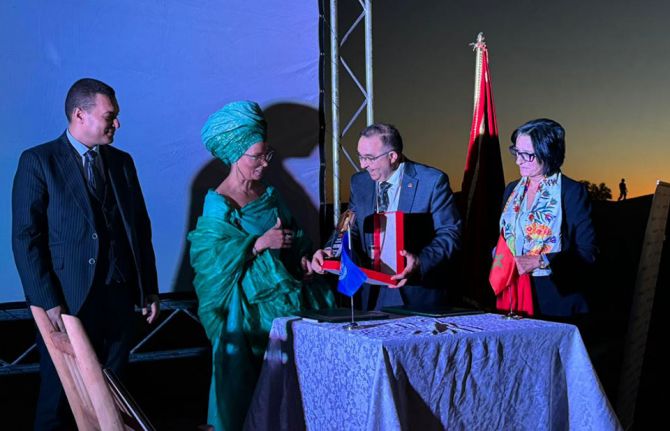
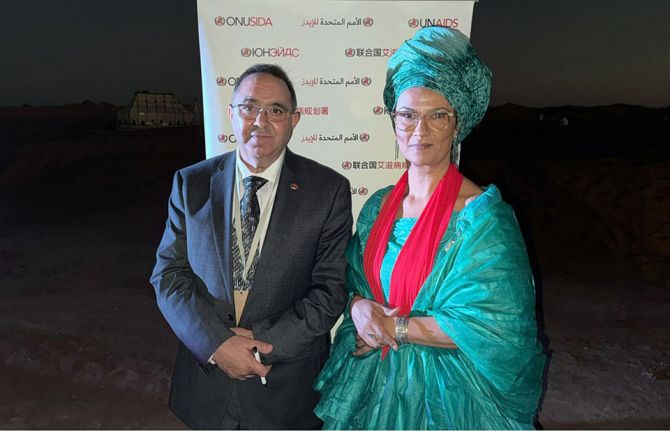
Press Release
UNAIDS appoints the artist OUM as National Goodwill Ambassador in Morocco
02 November 2024 02 November 2024MHAMID AL GHIZLANE, 2 November 2024 — The Joint United Nations Programme on HIV/AIDS (UNAIDS) is pleased to announce the appointment of renowned Moroccan artist OUM as its National Goodwill Ambassador in Morocco. The prestigious announcement was made at the Taragalte Festival, held from November 1-3, 2024, in Mhamid El Ghizlane, where OUM proudly serves as the festival's ‘Godmother.’ OUM’s influence and commitment to social change will play a vital role in UNAIDS' efforts to combat HIV/AIDS in Morocco and beyond.
“OUM’s appointment as National Goodwill Ambassador is a powerful step forward in our efforts to fight against HIV in Morocco,” said Houssine El Rhilani, UNAIDS Country Director for Morocco. “Her artistic influence and commitment to social causes will help amplify our messages of prevention, tolerance, and support for people living with HIV.”
In her new role, OUM will work to promote awareness and education around HIV prevention. She will also focus on fighting against the stigma and discrimination faced by people living with HIV. “As an artist, I have a platform to reach many people. It is my duty to use my voice to advocate for people living with and affected by HIV who are often unheard,” said OUM. “I am honored to take on this role with UNAIDS and am committed to supporting the fight against HIV in Morocco.”
Morocco faces significant challenges in the fight against HIV, with approximately 23,000 people currently living with the virus. The National Integrated Strategic Plan for HIV, Viral Hepatitis, and STIs (2024-2030) outlines essential actions to strengthen HIV prevention efforts and improve access to care, particularly for populations most affected by HIV. OUM's role as an ambassador is vital in driving these efforts forward.
OUM is no stranger to social advocacy, having previously collaborated with various United Nations agencies. Her engagement includes speaking on international platforms and participating in initiatives promoting women's rights and education. The official ceremony for OUM’s appointment highlighted her commitment to raising awareness around HIV issues in Morocco. It featured speeches from local leaders, including representatives from the region of Zagora and the Ministry of Health and Social Protection. The festival itself serves as a cultural backdrop, emphasizing the power of music and art in promoting peace and social change.
As UNAIDS continues its mission to end AIDS as a public health threat by 2030, collaboration with influential figures like OUM is crucial. Her role as National Goodwill Ambassador will not only increase awareness but also inspire collective action to ensure that all people affected by HIV, regardless of their status, have access to the care and support they need.
UNAIDS
The Joint United Nations Programme on HIV/AIDS (UNAIDS) leads and inspires the world to achieve its shared vision of zero new HIV infections, zero discrimination and zero AIDS-related deaths. UNAIDS unites the efforts of 11 UN organizations—UNHCR, UNICEF, WFP, UNDP, UNFPA, UNODC, UN Women, ILO, UNESCO, WHO and the World Bank—and works closely with global and national partners towards ending the AIDS epidemic by 2030 as part of the Sustainable Development Goals. Learn more at unaids.org and connect with us on Facebook, Twitter, Instagram and YouTube.
Region/country

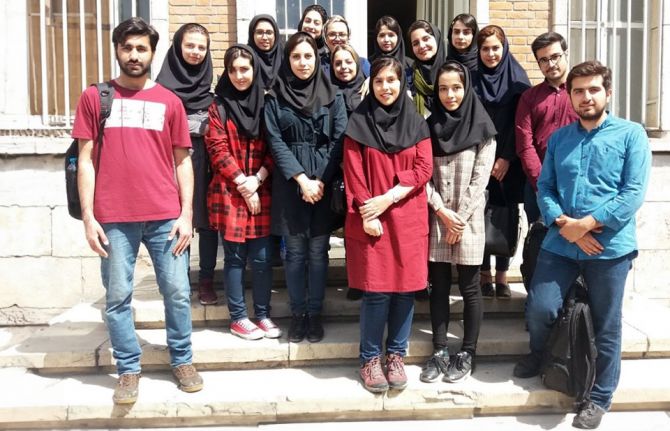
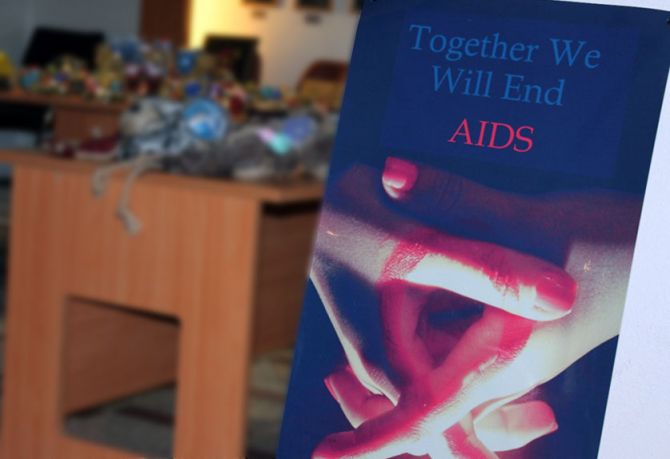
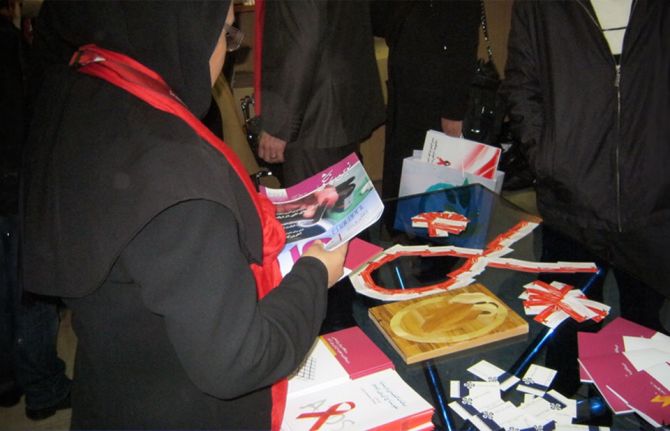
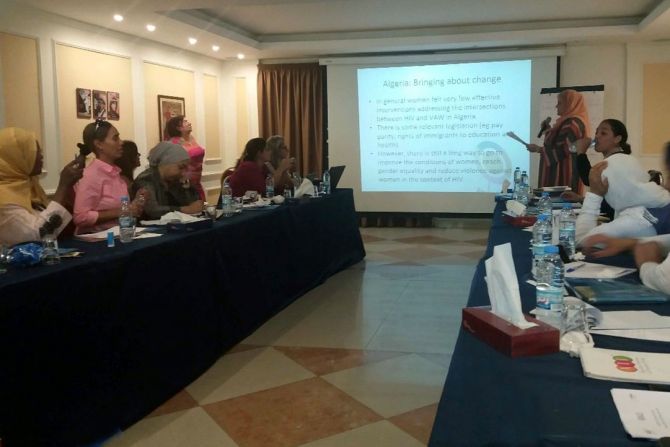
Feature Story
A transformative journey: Parisa's decades-long battle against HIV stigma and discrimination
18 July 2024
18 July 2024 18 July 2024Every pain yields a lesson, and every lesson transforms a person
Parisa's life was forever altered by HIV 25 years ago. The virus struck her family, snatching her husband's job and halting her child's education. Tragically, her husband passed away two years later, leaving Parisa to navigate the daunting landscape of loss and discrimination.
“I did not have a clue about this illness. It was, in fact, the first time I had even heard the word 'AIDS'”.
Undeterred by adversity, Parisa embarked on a relentless mission for human rights, determined to combat the pervasive stigma and discrimination surrounding HIV. Initially, she immersed herself in seminars and conferences, volunteering tirelessly at counselling centres, where she shared her own experiences to chip away at the stigma and discrimination.
“My activities in the Positive Club allowed me to broaden my knowledge and take more effective steps toward raising public awareness, reducing HIV stigma and discrimination, and helping my peers… IRCHA and UNAIDS supported me to expand my knowledge and gave me the chance to exchange my experiences with the members of Positive Clubs in and out of the country.”
Her unwavering dedication caught the attention of Dr Minoo Mohraz, the former director of the Iranian Research Centre for HIV/AIDS (IRCHA), who offered her a pivotal role in a Positive Club—a sanctuary for those grappling with similar challenges. Thus began Parisa's transformative journey, marked by a series of initiatives aimed at raising awareness, eradicating stigma and discrimination, and supporting her peers.
WHAT IS THE POSITIVE CLUB INITIATIVE? The Positive Club is a meeting place for people living with HIV, who run the club themselves, with supervision from Parisa and colleagues. At the club, people receive training in arts, and sports, and as peer educators. The Positive Club initiative was one of the successful programmes aimed at promoting positive health, dignity, and HIV prevention; it has been running for over 12 years with support from UNAIDS in collaboration with national partners and civil society organizations. Through this initiative, over 10,000 people living with HIV have been supported across 25 Positive Clubs, empowering them through training classes, workshops on HIV prevention, care and treatment, counselling sessions, and psychosocial support.
Over the years, Parisa's efforts have been nothing short of extraordinary. From managing a Positive Club in Tehran to representing people living with HIV in various influential platforms, including Iran's Country Coordinating Mechanism, its Oversight Committee, and Global Fund, she has been a relentless advocate for change.
Her initiatives have spanned diverse arenas, from radio shows and collaborations with filmmakers to training workshops for religious leaders and healthcare providers. Parisa's impact reverberates across borders, as she leverages regional platforms like MENA Rosa --the first regional network dedicated to women living with HIV in the Middle East and North Africa-- to exchange experiences and champion global efforts against HIV stigma and discrimination with a particular focus on Women living with and affected by HIV.
Amid the COVID-19 pandemic, Parisa's compassion for people living with and affected by HIV was once again evident. She mobilized support networks to provide essential supplies for Positive Club members and vulnerable families, ensuring that the crisis does not exacerbate the challenges faced by PLHIV.
Reflecting on the progress made over the last 25 years, Parisa acknowledged the remarkable strides in combating HIV-related stigma and discrimination. Efforts to eliminate HIV-related stigma and discrimination have been led by the UNAIDS Country Office for Iran, alongside national partners of the AIDS Control Programme. Notably, the first PLHIV Stigma Index study, conducted in 2010, laid the foundation for understanding the landscape of stigma in Iran. Subsequently, a second PLHIV Stigma Index study, was carried out by the network of PLHIV in collaboration with UNAIDS, Global Network of PLHIV (GNP+), International Community of Women Living with HIV (ICW), Johns Hopkins Medical University (JHMU), National AIDS Programme (NAP), and with financial support from Global Fund to Fight AIDS, Tuberculosis and Malaria (GFATM) /UNDP. Parisa played an important role in implementing the Stigma Index 2.0 which provided updated insights.
COMPARING OF BOTH OF IRAN’S STIGMA INDEX STUDIES A comparison between the two Stigma Index studies conducted ten years apart, using updated methodologies, revealed promising changes. The prevalence of self-stigma among PLHIV decreased significantly from 80% to 40%. Similarly, the percentage of PLHIV refraining from seeking medical help has decreased from 80% to 19%, underscoring improved accessibility to healthcare services and increased health-seeking behaviour among affected individuals. Overall, reports of stigma and discrimination have decreased from 71% to 47%, reflecting tangible improvements in societal attitudes to HIV.
Parisa reflects on these notable shifts in HIV-related Stigma observed between the two studies. In the initial Stigma Index conducted a decade ago, internal stigma was predominant among PLHIV, followed by societal and healthcare provider stigma. However, in the subsequent study, internal stigma was significantly reduced, while stigma and discrimination from healthcare providers emerged as the most prevalent issue. The improvement observed in internal stigma among PLHIV could be partly attributed to the work of the empowering Positive Clubs. Additionally, this improvement highlights the importance of ongoing efforts to address stigma and discrimination comprehensively, with a particular focus on healthcare settings. By acknowledging these shifts and persisting in their efforts, UNAIDS Iran, Parisa and her colleagues remain committed to building a future free from the burdens of HIV-related stigma and discrimination.
Through her nearly two decades of hotline counselling experience, Parisa has witnessed a shift in attitudes, with increased awareness and openness surrounding HIV discourse.
She credits grassroots campaigns and community-led initiatives for driving this transformation, paving the way for a more inclusive society.
“Positive Clubs have been played a very effective role in empowerment and phycological support to the members and reducing stigma and discrimination.”
In 2019, Iran joined the Global Partnership to Eliminate all forms of HIV-related stigma and discrimination, prioritizing a strong emphasis on interventions within communities, emergency/humanitarian settings, and healthcare facilities. With support from UNAIDS, protocols and training packages were developed to address stigma and discrimination in these critical areas. These efforts were carried out in close collaboration with national partners and civil society organizations, with training workshops being a key component of the initiative.
OVERVIEW OF GLOBAL PARTNERSHIP The Global Partnership for action to eliminate all forms of HIV-related stigma and discrimination is a critical vehicle for action to mobilise all countries to reach the political declaration and Global AIDS Strategy targets. It leverages partnerships to enhance coordination of interventions and funding; it provides knowledge and evidence-guided technical support; and increases accountability mechanisms and community leadership.
Parisa was actively involved in the implementation phase of these projects. Her contributions have been instrumental in advancing the work to eradicate HIV-related stigma and discrimination across humanitarian, healthcare, and community settings.
However, Parisa acknowledges the persistent challenges faced by PLHIV, from sporadic bouts of self-doubt to occasional rejections and the lingering shadows of depression and fear. Despite these hurdles, she remains steadfast in her belief that we can achieve a future free from stigma and discrimination.
As Parisa continues her tireless advocacy, her journey stands as a testament to the resilience of the human spirit and the power of collective action in fostering a world where every individual, regardless of their HIV status, is embraced with dignity and compassion.
“Of course, people living with HIV still experience stigma and discrimination at different stages of their lives but have a hope for a day free of stigma and discrimination.”
UNAIDS has played a pivotal role in the establishment and sustained operation of Positive Clubs for over a decade, catalyzing transformative changes in the lives of people living with HIV such as Parisa and in the fight against stigma and discrimination. Nonetheless, the journey towards eliminating stigma and discrimination remains unfinished, albeit considerably smoother and more steadfast with the collaborative efforts and political commitment of initiatives such as the Global Partnership.
“Together, we continue to pave the way towards a future free from the burdens of stigma and discrimination for all individuals living with and affected by HIV.”
Related
 U=U can help end HIV stigma and discrimination. Here’s how
U=U can help end HIV stigma and discrimination. Here’s how

27 February 2025
 Status of HIV Programmes in Indonesia
Status of HIV Programmes in Indonesia

24 February 2025


Press Statement
UNAIDS expresses deep concern over the passing of new anti-LGBT legislation in Iraq
30 April 2024 30 April 2024GENEVA, 30 April 2024—The Joint United Nations Programme on HIV/AIDS (UNAIDS) is deeply concerned about the impact of the harmful new legislation in Iraq amending the 1988 anti-sex work law to criminalize LGBTQ+ people. The legislation imposes a prison sentence of between 10 and 15 years for same-sex sexual relations. Transgender people face up to three years imprisonment for expressing their gender or receiving gender affirmation care. Individuals also face up to seven years for promoting homosexuality. And up to three years for providing gender affirmation care.
Criminalizing consensual same-sex relationships and gender expression not only violates fundamental human rights but also undermines efforts to end AIDS by driving marginalized populations underground and away from essential health services, including life-saving HIV prevention, treatment and care services.
Globally, the movement for human rights has made progress in the past 40 years. At the start of the AIDS pandemic in the early 1980s, most countries criminalized same-sex sexual activity between men, now two thirds do not. An increasing number of countries have also recognized the rights of trans and other gender diverse people. However, this new legislation in Iraq represents a significant setback and is part of a wave of punitive and restrictive laws being passed that undermine the rights of LGBTQ+ people.
The legislation passed in parliament is an amendment to an existing 1988 anti-sex work law which continues to criminalize both the selling and buying of sexual services. The amendments passed on Saturday 27 April 2024 increase the penalties in relation to sex work. These laws, which countries committed to removing under the 2021 United Nations General Assembly Political Declaration on HIV and AIDS, likewise undermine the human rights and public health of sex workers.
UNAIDS calls upon the authorities of Iraq to overturn this discriminatory legislation and fulfill its obligations under international human rights law to protect the rights of all people, regardless of sexual orientation or gender identity. UNAIDS stands in solidarity with LGBTQ+ people and communities and reaffirms its commitment to work with partners to promote equality, end stigma and discrimination, uphold human rights—including the right to health, and ensure access to comprehensive HIV services for everyone, everywhere.
UNAIDS
The Joint United Nations Programme on HIV/AIDS (UNAIDS) leads and inspires the world to achieve its shared vision of zero new HIV infections, zero discrimination and zero AIDS-related deaths. UNAIDS unites the efforts of 11 UN organizations—UNHCR, UNICEF, WFP, UNDP, UNFPA, UNODC, UN Women, ILO, UNESCO, WHO and the World Bank—and works closely with global and national partners towards ending the AIDS epidemic by 2030 as part of the Sustainable Development Goals. Learn more at unaids.org and connect with us on Facebook, Twitter, Instagram and YouTube.
Our work
Region/country

![Sudanese refugees gather as Doctors Without Borders (MSF) teams assist the war wounded from West Darfur, Sudan, in Adre hospital, Chad on June 16, 2023 [Mohammad Ghannam/MSF via Reuters] Sudanese refugees gather as Doctors Without Borders (MSF) teams assist the war wounded from West Darfur, Sudan, in Adre hospital, Chad on June 16, 2023 [Mohammad Ghannam/MSF via Reuters]](/sites/default/files/styles/large/public/sudan_960.jpg?itok=fqyF8jis)

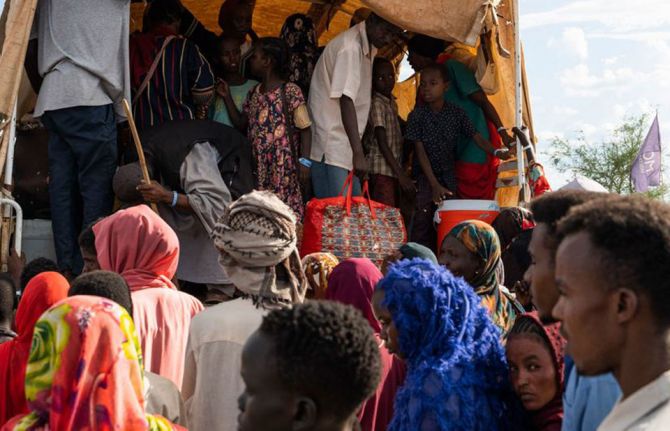
Feature Story
Sudan’s unsung heroes: Protecting people living with and affected by HIV amidst conflict and famine
15 April 2024
15 April 2024 15 April 2024One year ago, on 15 April 2023, armed conflict broke out in Sudan between the Sudanese Armed Forces and the Sudanese Rapid Support Forces. Since then, the situation has worsened. The hostilities, which were initially centred in Khartoum State, have intensified and rendered over half the country inaccessible.
The impact of this conflict has been devastating. Some 8.6 million Sudanese have been forced to flee their homes, 6.8 million are displaced with in the country and 1.8 million have sought refuge in neighbouring countries – Chad, Egypt and South Sudan.
The severity of the humanitarian emergency has been compounded by a deepening famine crisis, with 17.7 million Sudanese facing acute food insecurity, close to 5 million of whom are on the verge of starvation, as reported by OCHA and the Integrated Food Security Phase Classification.
In addition to the humanitarian crisis, the conflict has severely disrupted the healthcare infrastructure. The central depot, which stored all the antiretroviral treatment for people living with HIV in the country is inaccessible and the stock that it holds has since expired.
Before the conflict erupted, 11,000 people living with HIV in Sudan were on HIV treatment, 4000 of whom were lost to follow-up when the war broke out. All HIV prevention and testing services were suspended.
“We are adapting the HIV response in Sudan to the situation in the country. Our priority has been to get anti-retroviral treatment to those who need it, in whatever way we can,” said Elsheikh Ali, UNAIDS Country Director for Sudan.
Despite these challenges, there are unsung heroes who are working tirelessly to ensure that the HIV response continues uninterrupted.
Amidst active war, the displacement of critical partners in the HIV response, poor internet connectivity and communications, sporadic electricity and growing food insecurity, the HIV national response team, with UNAIDS’ support, were able to reconsider, plan and raise resources for this new, national context of the HIV response in the country. The team was able to submit a funding application to the Global Fund to Fight AIDS, TB and Malaria (Global Fund) and to finalize the Global Fund Grant Making process. This secured critical financial support to HIV, TB and Malaria for the next three years. The funds received from previous Global Fund cycles have been used to replace stocks of antiretroviral treatment (ARVs) as well as to establish new HIV treatment storage facilities in safer regions.
During the COVID pandemic, Sudan established a ‘Search and Rescue’ system to track people living with HIV who had their treatment interrupted. Once the conflict in the country escalated, the HIV national response team were able to draw on the ‘Search and Rescue’ system to locate most of the 4000 people living with HIV who were lost to follow-up because of the war and to re-enrol them again to receive HIV treatment services.
“We have heroes here in Sudan, including networks of people living with HIV, who are working in very difficult circumstances, traveling tens of kilometres and risking their safety, to personally deliver ARVs to the people who need it,” said Elsheikh Ali, UNAIDS Country Director, Sudan. “These are the people we should be applauding; they are the ones keeping the HIV response going in the middle of a war and famine.”
The Ministry of Health, whose infrastructure has been significantly disrupted, is trying to provide critical HIV services including treatment and PEP (emergency medicine for HIV taken to prevent the virus in case of potential exposure to the virus) in regions of the country where there is active warfare. In more stable areas, more comprehensive HIV services are now being offered to those who need them.
In the face of the escalating humanitarian crisis in Sudan, there are dedicated people who remain steadfast in their commitment and working selflessly to mitigate the impact of the conflict on the HIV response.
“The HIV national response team exemplify the resilience the AIDS response,” said Anne Githuku-Shongwe, UNAIDS Regional Director Eastern and Southern Africa. “In the face of adversity – war, displacement, famine – and against all odds, they have found a way to continue collaborating to uphold the HIV response.” She adds, “They have completed a successful Global Fund grant in the middle of an active war. They have made sure that people living with HIV across Sudan are not being left behind, that they are found, there is treatment available for them and that they receive it. That is resilience, commitment and leadership.”
Related
 Zambia - an HIV response at a crossroads
Zambia - an HIV response at a crossroads

24 February 2025
 Status of HIV Programmes in Botswana
Status of HIV Programmes in Botswana

20 February 2025

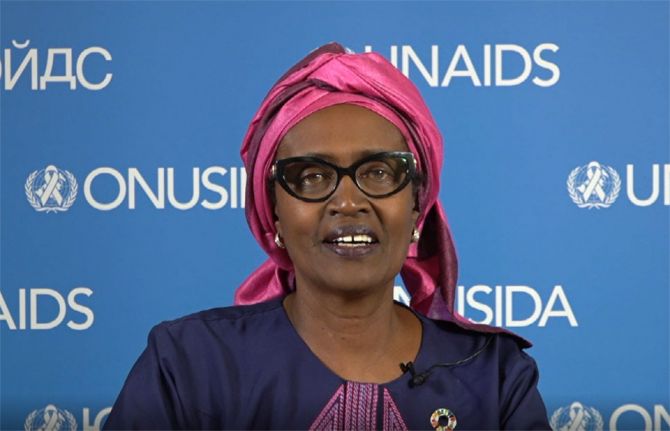
Opinion
UNAIDS Executive Director addresses first Arab Forum for Equality
30 May 2022
30 May 2022 30 May 2022The first Arab Forum for Equality, held in Amman on 30-31 May 2022, is organized by the ESCWA and the Pathfinders for Peaceful, Just and Inclusive Societies, and hosted by the Center on International Cooperation at the New York University. This is the inaugural meeting of the Forum, and the theme this year is “Towards inclusive youth employment in the Arab region”.
Following is UNAIDS Executive Director Winnie Byanyima’s address:
Greetings to all participants at this first and vital Arab Forum for Equality.
Thank you my dear sister, Rola Dashti, Executive Secretary of the United Nations Economic and Social Commission for Western Asia for inviting me.
I’ll share three lessons that we’ve learnt about inequality.
The first lesson is a worrying one: that inequality which was already extreme is being exacerbated even further.
In 2022, nearly half of humanity, 3.3 billion people are projected to be living below the poverty line of 5.50 USD a day. (Source: Oxfam)
New Oxfam estimates show that over a quarter of a billion more people could be pushed into extreme poverty in 2022.
A new billionaire has been created every 26 hours since the pandemic began. The world’s ten richest men have seen their fortunes double. (Oxfam)
A year and a half since the first doses of a COVID vaccine were delivered, 78% of people in the US are fully vaccinated, 69 % in Europe but still under 50% (46.26%) of people in the Arab region. (Our World in Data).
We also see huge inequalities within the Arab region. United Arab Emirates has reached 97% Covid vaccination. But it is a health emergency that Algeria is only at 15 % and Yemen at just 2.2%. (Our World in Data)
Since the onset of COVID19, wealth inequality has considerable increased in the Arab region, with the richest 10% of the population now controlling more than 80% of total regional wealth. (ESCWA)
Social protection expenditures among developed countries in the Arab States are just 4.2 per cent of GDP, lagging far behind the world average of 20 per cent. (ILO)
On average health expenditure across the Arab World is just 5% of GDP, nearly half that of the European Union (9.92%). (World Bank)
The second lesson is even more worrying: that we won’t be on track to overcome health or economic crises until inequalities come down.
These kinds of extreme, intersecting, inequalities increase the risks our societies face from pandemics such as AIDS and COVID-19. And we’ve seen with COVID just how quickly a health crisis is turned by inequalities into becoming a social, a political, an economic crisis.
The third lesson is a hopeful one, but that hope depends on action: inequalities are a political choice. Courageous leaders can tackle inequalities
We can close tax loopholes and tax holidays for companies.
We can go beyond the 15% tax rate agreement for all corporate taxation around the world, up to 25%.
We can ensure taxes are paid where economic activity happens.
We can increase investment in health, education and social protection.
We can reform laws and policies so that they help us reduce harm and risk, not worsen it.
We can change the global trade rules which kept life-saving vaccines locked up in the North
Inequality is a crisis but it is not fate, tackling it is within our hands.
UNAIDS
The Joint United Nations Programme on HIV/AIDS (UNAIDS) leads and inspires the world to achieve its shared vision of zero new HIV infections, zero discrimination and zero AIDS-related deaths. UNAIDS unites the efforts of 11 UN organizations—UNHCR, UNICEF, WFP, UNDP, UNFPA, UNODC, UN Women, ILO, UNESCO, WHO and the World Bank—and works closely with global and national partners towards ending the AIDS epidemic by 2030 as part of the Sustainable Development Goals. Learn more at unaids.org and connect with us on Facebook, Twitter, Instagram and YouTube.
Related
 Government ensures continuity of treatment in Malawi
Government ensures continuity of treatment in Malawi

10 February 2025

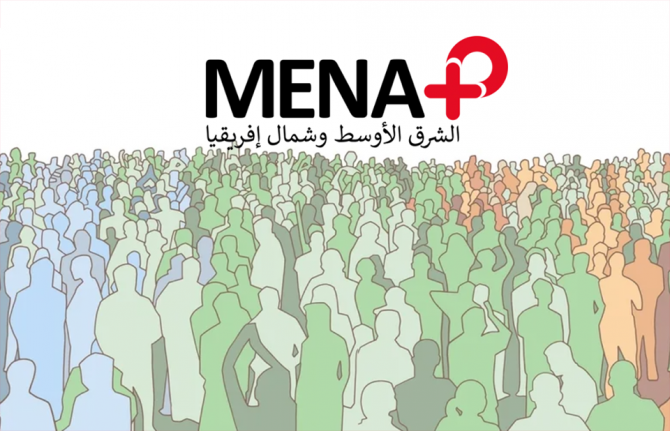
Feature Story
Regional network of people living with HIV launched in the Middle East and North Africa
19 April 2021
19 April 2021 19 April 2021The HIV epidemic in the Middle East and North Africa is still growing—an estimated 20 000 new HIV infections in 2019 marked a 25% increase over the 16 000 new infections in 2010. The region is far from controlling its HIV epidemic and HIV treatment coverage is low, with only 38% of people living with HIV accessing HIV treatment in 2019, resulting in 8000 people dying from AIDS-related illnesses in the region.
Community-based organizations can play important roles in the region’s HIV response, but they are constrained in many countries by limited civic space and resources. In response, community leaders living with HIV have come together to launch the first regional network of people living with HIV, MENA Plus, to strengthen the community HIV response in the region.
“It is time people living with HIV have a network where they make their own decisions and get our rights without stigma and discrimination,” said Amina Ibrahim (not her real name), a member of MENA Plus from Egypt.
With a vision of a society where people living with HIV live with respect and dignity, enjoy their full rights and have equal opportunities, MENA Plus aims to enhance the leadership, representation and effective engagement of people living with HIV across the Middle East and North Africa.
“We need to discuss the suffering of people living with HIV, and especially of children living with HIV, and how to educate them about living their lives,” said Soumayya Abdelwafi (not her real name), a member of MENA Plus from Morocco.
The network will advocate for HIV treatment and prevention services in the region, the sustainability of HIV funding and ending vertical (from mother to child) transmission of HIV and new HIV infections among children.
MENA Plus will put a strong emphasis on human rights, campaigning on sexual and reproductive rights, sensitization on gender diversity and sexual orientation and the rights of minorities and key populations—vital for a region whose HIV epidemic is highly concentrated among key populations and their sexual partners.
“With diversity, we enrich networking and advocacy to help achieve rights,” said Souhaila Abdalla (not her real name), a member of MENA Plus from Tunisia.
Through enhancing the leadership, representation and effective participation of people living with HIV, especially in decision-making around health and social and financial programmes, MENA Plus aims to empower people living with HIV in the region.
“MENA plus is a welcome addition to our UNAIDS team of partners across the Middle East and North Africa. Our friends, family and colleagues living with HIV have shown remarkable resilience, determination and innovation in responding to the interconnected challenges posed by HIV and COVID-19 in recent years. Through MENA Plus, their work has the potential for even greater impact, as the new global AIDS strategy puts community-led responses at the heart of UNAIDS’ work,” said Shereen El Feki, Director of the UNAIDS Regional Support Team for the Middle East and North Africa.
Programme area
Region/country
Related

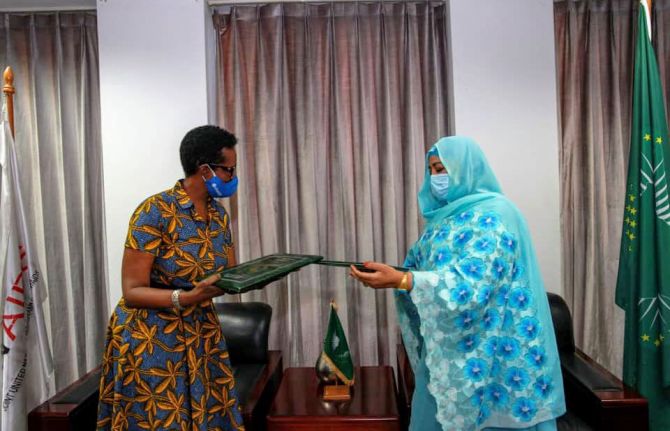
Feature Story
UNAIDS renews partnership with the African Union for a stronger and more resilient AIDS response in Africa
17 March 2021
17 March 2021 17 March 2021UNAIDS and the African Union have signed a new memorandum of understanding (MoU) to reinforce their partnership and to recommit member states to end AIDS through the Catalytic Framework to End AIDS, TB and Eliminate Malaria in Africa by 2030.
The MoU commits partners to work towards addressing the socioeconomic and political impact of HIV in Africa and accelerate the goal of reaching universal health coverage to take AIDS out of isolation. It will pave the way for more resilient, agile and inclusive health systems in Africa.
“The renewed MoU between the African Union and UNAIDS opens new windows of cooperation and new opportunities for ending AIDS in Africa. We need to deliver on this promise—it is doable,” said Amira Elfadil Mohammed Elfadil, Commissioner for the Department of Health, Humanitarian Affairs and Social Development, at the signing ceremony.
The Department of Health, Humanitarian Affairs and Social Development, formerly known as the Department of Social Affairs, will coordinate African Union Commission departments and organs to ensure that HIV remains a continental priority and is integrated into the broader development, human rights, humanitarian and peace and security agenda of the African Union.
“I am delighted to sign the renewed MoU with the African Union,” said UNAIDS Executive Director, Winnie Byanyima. “The African Union is one of UNAIDS’ most important partners. I look forward to reinforcing our relationship to put communities at the centre of the response to HIV, address other health challenges such as COVID-19 and reduce inequalities that increase people’s vulnerability.”
This year is a pivotal year as United Nations Member States are expected to recommit to the HIV response with the adoption of a new political declaration in June. The partnership agreement with the African Union is being signed as the continent grapples with overburdened and insufficiently financed health systems in the face of the COVID-19 pandemic.
Related
 Zambia - an HIV response at a crossroads
Zambia - an HIV response at a crossroads

24 February 2025
 Status of HIV Programmes in Botswana
Status of HIV Programmes in Botswana

20 February 2025

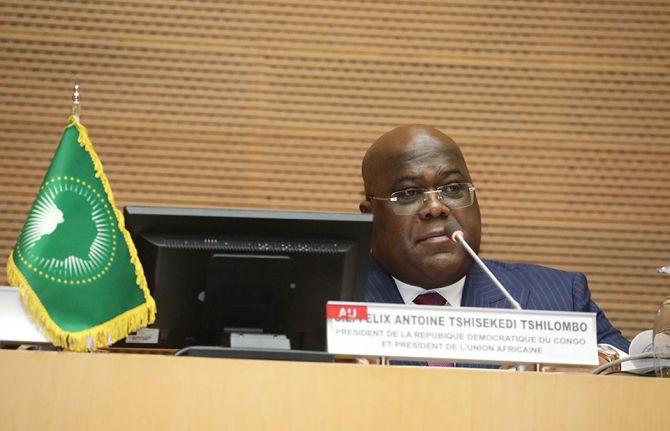
Feature Story
Félix Tshisekedi, President of the Democratic Republic of the Congo and 2021 African Union Chair, calls on his peers to learn from HIV and strengthen health systems
15 February 2021
15 February 2021 15 February 2021The 34th Ordinary Assembly of the African Union Heads of States and Government was held virtually on 6 and 7 February 2021.
The President of the Democratic Republic of the Congo and new Chair of the African Union, Félix Tshisekedi, pictured above, urged Member States not to forget devastating global epidemics, such as malaria and AIDS, and learn from them to strengthen health systems, including the reinforcement of the Africa Centers for Disease Control and Prevention.
“Leveraging the experiences we have gained in the fight against adversity and our ability to adapt, we should not give up. Let us not forget other pandemics, often more deadly, that are still affecting the continent, like malaria and HIV,” said the President of the Democratic Republic of the Congo.
The assembly recognized the African Union’s role in mounting a united, innovative and strong partnership among Member States to address the COVID-19 pandemic, which has had a significant economic impact on Africa and further weakened its health systems.
Heads of states committed to sustaining efforts to curb the spread of the virus and mitigate its socioeconomic impact by using the Africa Continental Free Trade Agreement and to implement a coordinated vaccination programme through the Africa Vaccine Acquisition Task Team to ensure that no country is left behind.
“In responding to the pandemic, we have been at the forefront of innovation. We established the groundbreaking Africa Medical Supplies Platform to assist African Union Member States to access affordable medical supplies and equipment,” said the President of South Africa, Cyril Ramaphosa, pictured above.
The President of South Africa commended heads of states for their extraordinary and decisive leadership in tackling the COVID-19 crisis. He expressed dismay at the increase in violence against women and called on the continental body to prioritize women’s economic empowerment and develop a convention to promote, protect and fulfil women’s rights. He called on Member States to ratify International Labour Organization Convention No. 190 on eliminating harassment and violence in the world of work.
Aside from the African Union Chair’s handover from South Africa to the Democratic Republic of the Congo, the two-day assembly marked critical decisions on the implementation of the African Union’s institutional reform, including its Commission, and the election of four new commissioners. Moussa Faki Mahamat was re-elected as the African Union Commission Chairperson for a second four-year term and newly elected Monique Nsanzabaganwa, the first female in the history of the Commission, as his deputy.
“I congratulate the President of the Democratic Republic of the Congo, Félix Tshisekedi, for taking the reins as the Chair of the African Union for 2021 and commend him for calling on his peers to sustain efforts in the AIDS response and strengthen health systems in Africa while we are still facing the COVID-19 pandemic. I reaffirm UNAIDS’ support to the African Union. Saving lives, tackling inequalities and advancing universal health care are lessons learned from AIDS to address current and future pandemics successfully,” said Clémence Aissatou Habi Baré, Director of the UNAIDS Liaison Office to the African Union and United Nations Economic Commission for Africa.
Related
 Zambia - an HIV response at a crossroads
Zambia - an HIV response at a crossroads

24 February 2025
 Status of HIV Programmes in Botswana
Status of HIV Programmes in Botswana

20 February 2025

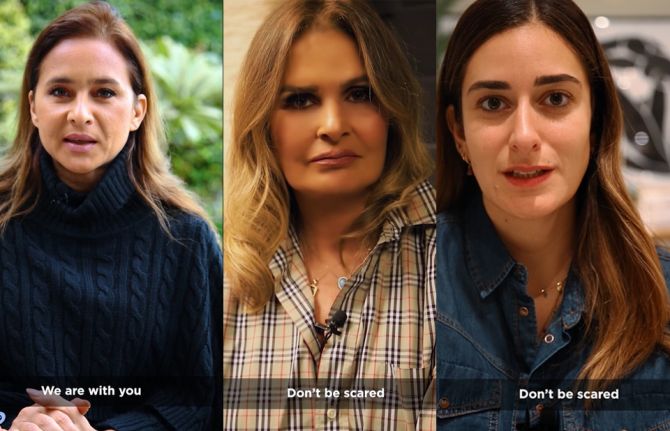
Feature Story
New awareness campaign on gender-based violence in the Middle East and North Africa
25 November 2020
25 November 2020 25 November 2020Like HIV, the COVID-19 pandemic thrives on inequalities and inequities. In addition to its impact on people’s health, the COVID-19 pandemic has resulted in significant increases in gender-based violence around the globe, including in the Middle East and North Africa.
Some countries in the region lack essential services for survivors of violence, especially in, for example, rural areas, conflict zones or humanitarian settings. Where services do exist, they do not always reach marginalized women and girls, and in many cases have been reduced or de-prioritized during the pandemic. Gender-based violence in the Middle East and North Africa is also sometimes not prioritized by the police and justice systems and many countries do not criminalize domestic violence, marital rape and other forms of gender-based violence that are particularly relevant in the region, such as female genital mutilation.
The United Nations Issue-Based Coalition on Gender, Justice and Equality is taking a twin-track approach to gender-based violence in the region, combining a programmatic response that prevents gender-based violence and supports survivors with the launch of a region-wide awareness campaign. The campaign uses the regional goodwill ambassadors of the coalition United Nations agencies to shed light on the risks that women and girls face as a result of the health crisis and to raise people’s awareness on how to counter gender-based violence and support survivors.
“Any form of violence against women and girls is a direct violation of human rights. I want to assure every violated woman and girl through this campaign that we are all with you,” said Yousra, UNAIDS Goodwill Ambassador for the Middle East and North Africa.
The joint campaign is an illustration of the strength of collaboration among United Nations agencies and what partnerships can do in building and empowering the global appeals and calls to action of the United Nations Secretary-General and the Spotlight Initiative, a global, partnership between the European Union and the United Nations to eliminate all forms of violence against women. The campaign leverages the ability of regional celebrities to reach local communities to raise awareness on the compounding impact of COVID-19 on gender-based violence and the vulnerabilities of marginalized and vulnerable groups.
“The response to COVID-19 in this region, and globally, has shown us that when we act in solidarity, in true partnerships and with a sense of shared responsibility, we can win against the intertwining health threats of COVID-19, HIV and the shadow pandemic of gender-based violence,” said Rangayian Gurumurthy, Director, a.i., of the UNAIDS Regional Support Team for the Middle East and North Africa.
“During COVID-19, most of us are confined in our homes with our partners. This has increased relationship problems, as well as social and economic problems. Many are subjected to violence from our close family or our intimate partner. That is why our nongovernment organization dedicated a hotline for psychological support,” said a woman living with HIV in the Islamic Republic of Iran.
Related
 Government ensures continuity of treatment in Malawi
Government ensures continuity of treatment in Malawi

10 February 2025



